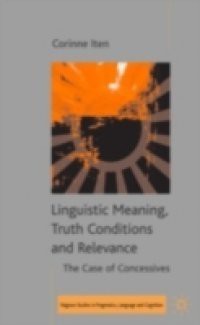The traditional approach to linguistic meaning in linguistics and philosophy uses the notion of truth to capture meaning. Most commonly, the meaning of a sentence is captured by stating its truth condition. The meaning of an individual word is then captured by specifying the contribution it makes to the truth conditions of the sentences in which it occurs. This book focuses on the existence of 'non-truth-conditional' expressions, that is, meaningful linguistic expressions that do not affect the truth conditions of the sentences in which they occur and whose meanings cannot be captured in truth-conditional terms.The first part of the book discusses the relationship between language and truth, gives an overview of ways in which 'non-truth-conditional' expressions have been dealt with in truth-conditional theories and argues in favour of the cognitive approach to linguistic meaning of Relevance Theory. The second part supports the arguments of the first with specific analyses of the 'concessive' expressions but, although and even if.

